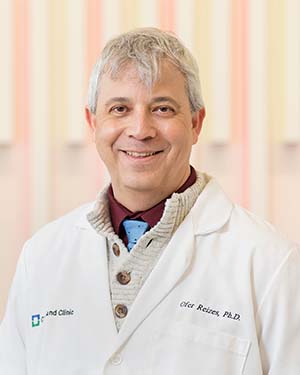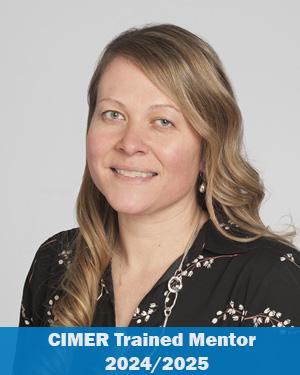Research News
05/14/2025
Cleveland Clinic receives Department of Defense grant to further study chemoresistance in ovarian cancer
Two investigators are combining their expertise to better understand protein CD55 and its role in chemoresistance.

Cleveland Clinic investigators received a $1.9 million grant from the Department of Defense to continue investigating the protein CD55 and its chemo resistant properties in ovarian cancer. Ofer Reizes, PhD and Michelle Longworth, PhD are combining their expertise to better understand the processes through which CD55 makes the notoriously difficult-to-treat cancer more resistant to chemotherapy.
This work is a continuation of previous research from the Reizes Lab generously supported through The Laura J. Fogarty Endowed Chair for Uterine Research. The support led to his team’s discovery of a new location for CD55 in the nucleus of ovarian and uterine cancer cells. Once inside, CD55 promotes chemoresistance and aggressive cancer stem cell growth. How exactly CD55 is operating is at the heart of what Drs. Reizes and Longworth plan to investigate in this newly funded work. The answers could help fine tune treatment plans and aid in the future development of new therapies targeting CD55.
Dr. Reizes is investigating the mechanism behind how CD55 moves from the cell surface to the nucleus. His lab is also testing the ability to block the protein’s movement, which could prevent the chemo resistant properties from occurring in the first place. New strategies could apply to other cancers as well, and the team will independently be looking at its applicability to uterine cancers.
Dr. Longworth’s background focuses on the way our DNA is organized to fit within our cell's nucleus, a compartment 200,000x smaller than the DNA itself. Her lab will be examining what CD55 is doing in the nucleus and how it physically interacts with our DNA to change the way it is organized. These interactions can regulate which genes are "turned on," or expressed, to help promote cancer stem cell generation and maintenance.
“It’s crucial for us to fully understand the new biology of this critical protein,” Dr. Reizes says. “Dr. Longworth and I are taking two different, but equally valid, approaches to get there, which is a huge benefit for the science — we really complement each other’s skills.”
The Reizes and Longworth labs will also examine potential biomarkers indicating CD55’s chemoresistance. A biomarker would allow a physician to test whether CD55 has already entered the nucleus when a patient is first diagnosed with ovarian cancer. If that’s the case, the doctor may avoid chemotherapy as the patient is most likely already resistant to it, saving the patient from unnecessary discomfort.
“If someone is on a specific chemotherapeutic, there's a good chance they can't be on something else that might actually be better for them,” Dr. Longworth says. “If we can help develop a way for a physician to gather more concrete data on the status of the patient’s cancer, hopefully it leads them to better inform and enhance their patient care.”
Featured Experts
News Category
Related News
Research areas
Want To Support Ground-Breaking Research at Cleveland Clinic?
Discover how you can help Cleveland Clinic save lives and continue to lead the transformation of healthcare.
Give to Cleveland Clinic
